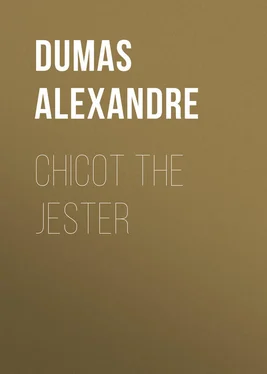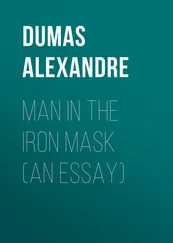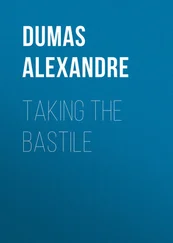Alexandre Dumas - Chicot the Jester
Здесь есть возможность читать онлайн «Alexandre Dumas - Chicot the Jester» — ознакомительный отрывок электронной книги совершенно бесплатно, а после прочтения отрывка купить полную версию. В некоторых случаях можно слушать аудио, скачать через торрент в формате fb2 и присутствует краткое содержание. Жанр: literature_19, foreign_antique, foreign_prose, на английском языке. Описание произведения, (предисловие) а так же отзывы посетителей доступны на портале библиотеки ЛибКат.
- Название:Chicot the Jester
- Автор:
- Жанр:
- Год:неизвестен
- ISBN:нет данных
- Рейтинг книги:5 / 5. Голосов: 1
-
Избранное:Добавить в избранное
- Отзывы:
-
Ваша оценка:
- 100
- 1
- 2
- 3
- 4
- 5
Chicot the Jester: краткое содержание, описание и аннотация
Предлагаем к чтению аннотацию, описание, краткое содержание или предисловие (зависит от того, что написал сам автор книги «Chicot the Jester»). Если вы не нашли необходимую информацию о книге — напишите в комментариях, мы постараемся отыскать её.
Chicot the Jester — читать онлайн ознакомительный отрывок
Ниже представлен текст книги, разбитый по страницам. Система сохранения места последней прочитанной страницы, позволяет с удобством читать онлайн бесплатно книгу «Chicot the Jester», без необходимости каждый раз заново искать на чём Вы остановились. Поставьте закладку, и сможете в любой момент перейти на страницу, на которой закончили чтение.
Интервал:
Закладка:
The duke frowned, and ground his teeth with anger, grew pale, and galloped on so fast, that Bussy and his, companions were left in the rear.
“Ah! ah! it seems that the joke is a good one,” said Antragues.
“And so much the better, that everyone does not seem to find it a joke,” said Bussy.
A moment after, they heard the duke’s voice calling Bussy. He went, and found the duke laughing.
“Oh!” said he, “it appears that what I said was droll.”
“I am not laughing at what you said.”
“So much the worse; I should have liked to have made a prince laugh, who hardly ever does so.”
“I laugh at your inventing a false story to find out the true one.”
“No, I told you the truth.”
“Well, then, as we are alone, tell me your little history. Where did it happen?”
“In the wood of Méridor.”
The duke grew pale again, but did not speak.
“Decidedly,” thought Bussy, “the duke is mixed up with that story. Pardieu! monseigneur,” said he, “as M. de Monsoreau seems to have found the method of pleasing you so well, teach it to me.”
“Pardieu! yes, Bussy, I will tell you how. Listen; I met, by chance, at church, a charming woman, and as some features of her face, which I only saw through a veil, recalled to me a lady whom I had much loved, I followed her, and found out where she lived. I have gained over her servant, and have a key of the house.”
“Well, monseigneur, all seems to go well for you.”
“But they say she is a great prude, although free, young, and beautiful.”
“Ah! you are romancing.”
“Well, you are brave, and love me?”
“I have my days.”
“For being brave?”
“No, for loving you.”
“Well, is this one of the days?”
“I will try and make it one, if I can serve your highness.”
“Well, I want you to do for me what most people do for themselves.”
“Make love to her, to find out if she be a prude?”
“No, find out if she has a lover. I want you to lay in wait and discover who the man is that visits her.”
“There is a man then?”
“I fear so.”
“Lover, or husband?”
“That is what I want to know.”
“And you want me to find out?”
“If you will do me that great favor – ”
“You will make me the next chief huntsman.”
“I have never yet done anything for you.”
“Oh! you have discovered that at last.”
“Well, do you consent?”
“To watch the lady?”
“Yes.”
“Monseigneur, I confess I do not like the commission.”
“You offered to do me a service, and you draw back already!”
“Because you want me to be a spy.”
“I ask you as a friend.”
“Monseigneur, this is a sort of thing that every man must do for himself, even if he be a prince.”
“Then you refuse?”
“Ma foi! yes.”
The duke frowned. “Well, I will go myself,” said he, “and if I am killed or wounded, I shall say that I begged my friend Bussy to. undertake the task, and that for the first time he was prudent.”
“Monseigneur, you said to me the other night, ‘Bussy, I hate all those minions of the king’s who are always laughing at and insulting us; go to this wedding of St. Luc’s, pick a quarrel and try to get rid of them.’ I went; they were five and I was alone. I defied them all; they laid wait for me, attacked me all together, and killed my horse, yet I wounded three of them. To-day you ask me to wrong a woman. Pardon, monseigneur, but that is past the service which a prince should exact from a gallant man, and I refuse.”
“So be it; I will do my work myself, or with Aurilly, as I have done already.”
“Oh!” said Bussy, with a sudden thought.
“What?”
“Were you engaged on it the night when you saw the ambush laid for me?”
“Just so.”
“Then your beautiful unknown lives near the Bastile.”
“Opposite the Rue St. Catherine. It is a dangerous place, as you know.”
“Has your highness been there since?”
“Yesterday.”
“And you saw?”
“A man spying all about and who at last stopped at her door.”
“Was he alone?”
“Yes, at first. Afterwards he was joined by another, with a lantern in his hand.”
“Ah!”
“Then they began to talk together, and at last, tired of waiting, I went away. And before I venture into the house where I might be killed – ”
“You would like one of your friends to try it.”
“They would not have my enemies, nor run the same risk; and then they might report to me – ”
“In your place I would give up this woman.”
“No, she is too beautiful.”
“You said you hardly saw her.”
“I saw her enough to distinguish splendid blonde hair, magnificent eyes, and such a complexion!”
“Ah! ah!”
“You understand! one does not easily renounce such a woman.”
“No, I feel for you.”
“You jest.”
“No, on my word, and the proof is, that if you will give me my instructions, I will watch this evening.”
“You retract your decision?”
“There is no one but the pope infallible; now tell me what I am to do.”
“You will have to hide a little way off, and if a man enter, follow him to find out who he is?”
“But if, in entering, he close the door behind him?”
“I told you I had a key.”
“Ah! true; then there is only one more thing to fear, that I should follow a wrong man to a wrong door.”
“You cannot mistake; this door is the door of an alley, and at the end of the alley there is a staircase; mount twelve steps, and you will be in a corridor.”
“How do you know all this, if you have never been in?”
“Did I not tell you I had gained over the servant? She told me all.”
“Mon Dieu! how convenient it is to be a prince. I should have had to find out all for myself, which would have taken me an enormous time, and I might have failed after all.”
“Then you consent?”
“Can I refuse your highness? But will you come with me to show me the house?”
“Useless; as we return from the chase, we will make a detour, and pass through the Porte St. Antoine, and I will point it out to you.”
“Very well, and what am I to do to the man if he comes?”
“Only follow him till you learn who he is. I leave to you your mode of action. And not a word to any one.”
“No, on my honor.”
“And you will go alone?”
“Quite.”
“Well, then, it is settled; I show you the door on our way home; then you come with me, and I give you the key.” Bussy and the prince then rejoined the rest. The king was charmed with the manner in which M. de Monsoreau had conducted the chase.
“Monseigneur,” then said M. de Monsoreau to the duke, “I owe my place and these compliments to you.”
“But you know that you must go to-night to Fontainebleau, where the king will hunt to-morrow and the day after.”
“I know, monseigneur; I am prepared to start to-night.”
“Ah, M. de Monsoreau, there is no more rest for you,” said Bussy, “you wished to be chief huntsman, and you are so, and now you will have at least fifty nights’ rest less than other men. Luckily you are not married.”
At this joke, Monsoreau’s face was covered once more with that hideous paleness which gave to him so sinister an aspect.
CHAPTER XII.
HOW BUSSY FOUND BOTH THE PORTRAIT AND THE ORIGINAL
The chase terminated about four o’clock in the evening, and at five all the court returned to Paris. As they passed by the Bastile, the duke said to Bussy, “Look to the right, at that little wooden house with a statue of the Virgin before it; well, count four houses from that. It is the fifth you have to go to, just fronting the Rue St. Catherine.”
Читать дальшеИнтервал:
Закладка:
Похожие книги на «Chicot the Jester»
Представляем Вашему вниманию похожие книги на «Chicot the Jester» списком для выбора. Мы отобрали схожую по названию и смыслу литературу в надежде предоставить читателям больше вариантов отыскать новые, интересные, ещё непрочитанные произведения.
Обсуждение, отзывы о книге «Chicot the Jester» и просто собственные мнения читателей. Оставьте ваши комментарии, напишите, что Вы думаете о произведении, его смысле или главных героях. Укажите что конкретно понравилось, а что нет, и почему Вы так считаете.












